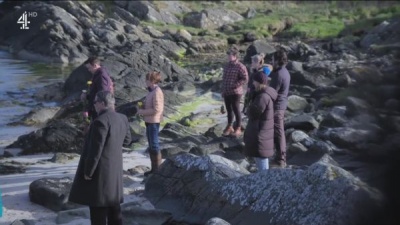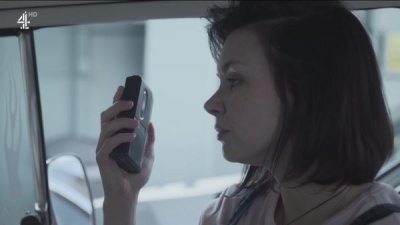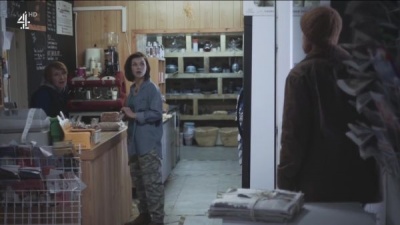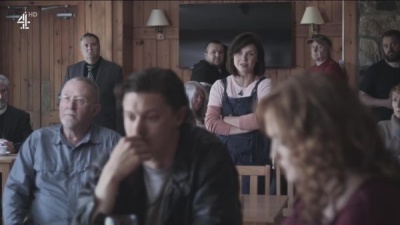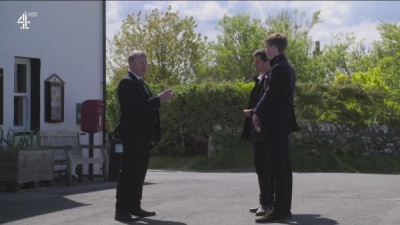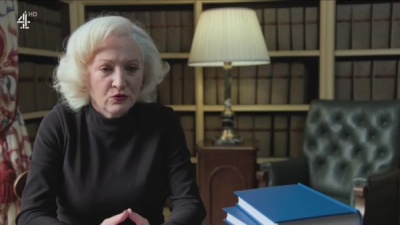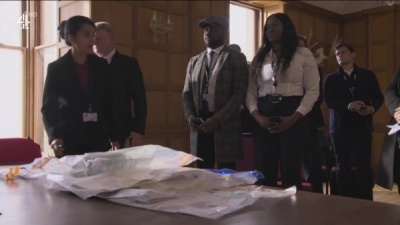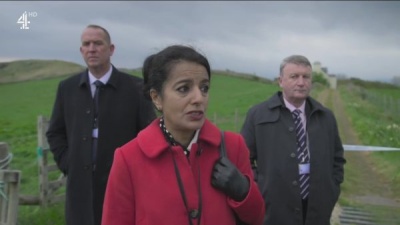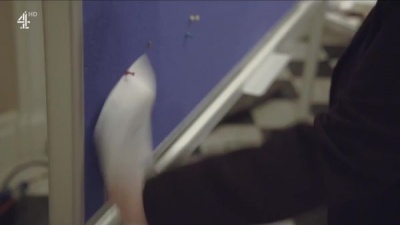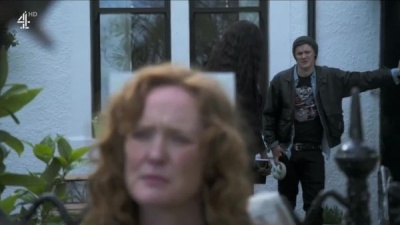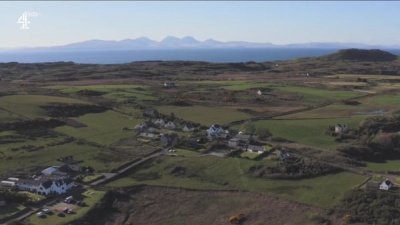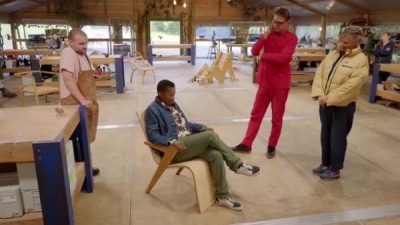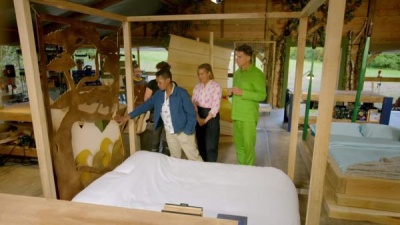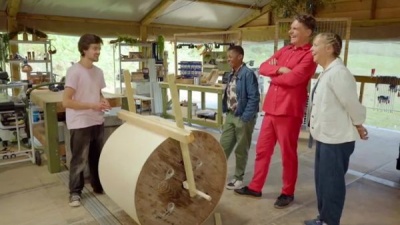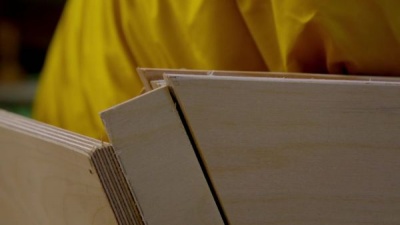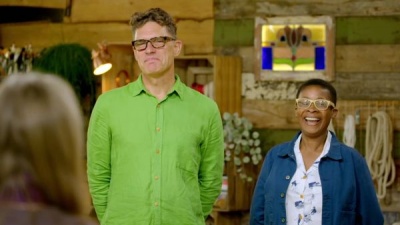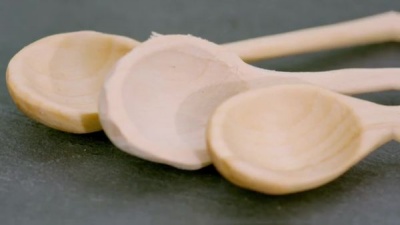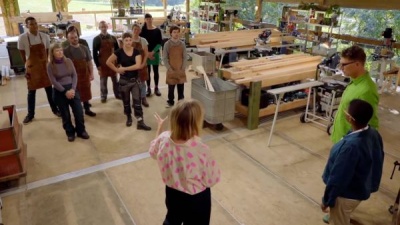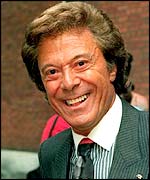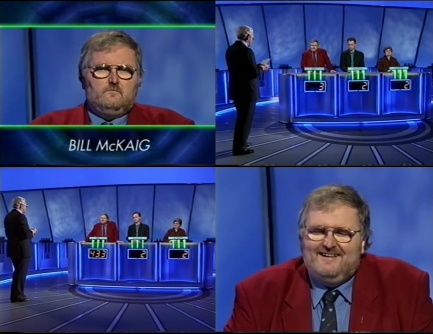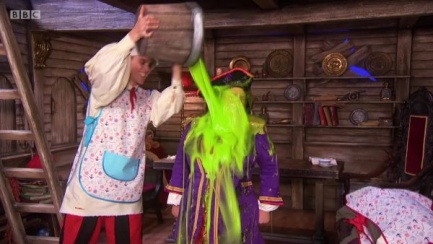Weaver's Week 2021-11-14
Last week | Weaver's Week Index | Next week
"You live by the sword, you die by the sword." What is this, the Nasty Nick tribute hour?
Contents |
Murder Island
STV/Motion Content Group for Channel 4, 5 October – 9 November
A few weeks ago, we noted how LARP was television's latest trend. People step out of their lives, and pretend to be something they're not. The latest example is Murder Island, Channel 4's six-week investigation into a fictional killing. We're not going to reveal who did it, and we're not going to explain why they did do it, but there are plenty of spoilers that might hurt if you're watching from the start.
The basic plot is simple: there's been a murder. Pairs of amateur sleuths are tasked with one task: work out who did it, and provide enough evidence to convince a sceptical prosecutor that there's enough evidence to go to court.
Everyone involved in the show is acting. A cast of professional actors play the inhabitants of Hirsa, a small community off the Scottish coast. Turns out that they're all suspects, all have a motive and might have the opportunity to do the foul deed. The island is also acting, "Hirsa" is known as "Gigha" to its mother.
Teams of two amateur sleuths play the role of detectives, and contestants. There's a betrothed couple from London, some brothers-in-law, the grannies next door, and some young besties.
The cast is completed by Parm Sandhu, Simon Harding, and Graham McMillan. All are acting roles they've lived in the real world, all are retired senior police officers.
Channel 4 have made an effort with Murder Island, the plot has been scripted by Ian Rankin, the professional crime fiction writer. Rankin has put in more twists than he might like in his novels, because the television show has to have a climax at the end of each episode, and a moment of tension before each commercial break. He also had to make sure the retired cops couldn't guess the killer until it became obvious.
What was in Ian Rankin's plot? A little of everything. Fashionable concerns – the environment, land ownership, sexuality and religion, drugs and alcohol. More timeless topics – underemployment, how a small close-knit community functions, how it welcomes and accepts incomers. And universal questions: jealousy, hopelessness, spousal abuse, pregnancy and what are the straights doing this week?
Rankin included some massive red herrings: an international drugs cartel was introduced in episode 2, and completely forgotten after episode 4. Pregnancy appeared as a motive throughout the series, until it disappeared in a touch of magic. Rankin was beavering away in the background, one of 23 people credited as "producer", "assistant producer", "executive producer", or something similar.
The show had an unusual look. Footage of the detectives doing their interviews is intercut with dramatic reconstructions of the events shown. It's far more interesting than a simple talking head, and ensures the programme isn't bogged down in too much detail. Took us a couple of episodes to get used to the pace, but in retrospect it's exactly the right choice. Narration was provided by the deceased victim – a gimmick that became background noise in very short order. There were also comments from the police and detectives added in post-production.
Watching the detectives
We viewers get to see all the evidence, and got to see all the dramatic reconstructions. The teams won't have seen the drama, and it's not clear how much information is shared between the teams. Did all teams talk to all witnesses? Did they get different results from their own styles? We weren't shown any differences.
There are tips for general interviews: ask open questions – "discuss... explain... how did that work... what happened next?" Wonder if they've passed this information up the schedule to Countdown. We're also told to check and challenge everything – by someone asking us to take this advice on trust, without providing any corroborating evidence.
And evidence was in short supply throughout the production. Early in episode three, the Prosecutor came to visit. (She's played by Claire Mitchell, another actor reprising her old professional job.) "Where's the evidence? What evidence do you have for this?" she asked. But there wasn't much evidence to find, the contestants had been drip-fed some red herrings (Charley's love life, the drugs find) but almost nothing that ended up being helpful to find the actual killer. The DNA and forensics report wouldn't be delivered until the next day, along with extracts from Charley's diary.
When the information did appear, it came as a horrible deus ex machina. Nothing was more pivotal than the contribution from Charley's father in episode 5. Boom, the questions about Charley's love life were resolved – sufficiently for the plot, if not for the "question everything" mantra at the start of the series. Charley's father gave a massive clue about a key item missing from Charley's house – something we'd briefly seen in the opening moments of the series and then not mentioned again.
The series suffered from massive social snobbery amongst the detectives: the senior police officer's first words to the detectives were "You will address me as 'Marm'." Marm (played by Parm Sandhu) insisted that everyone stand when she walked in the room. Welcome back to 1950s boarding school. Does this hierarchy serve any purpose, other than to bolster the ego of the Marm character?
Real life pokes us in the ribs
In real life, Parm Sandhu made a lot of appearances on the network news programmes, making considered criticisms of her former employer the "Metropolitan Police" of London. Late in September, it emerged the London police force had harboured a murderer, ignored many warnings about his conduct, and through their inaction had given him the opportunity to kill the wholly innocent Sarah Everard.
Another of the ex-police on Murder Island, Simon Harding, had also appeared on the news. He had intimated that the real-life murderer was somehow "not a police officer". This is in spite of the murderer's very real uniform, his very real warrant card, his very real payslip from the police, and his very real assertions of authority.
The coincidence between this fictional show and the factual news was unfortunate. Did Murder Island make a contribution to the ongoing discussion about violence against women, and about everyone's safety against the police? No, it didn't address these social questions, other than in the most oblique fashion. Did Charley have to be female: would the plot have worked as well if she'd been a bloke? Very probably, especially for a writer of Ian Rankin's ability.
If we were in Channel 4's shoes, we might have preferred to delay the series for few weeks, not least to make a greater distinction between the various acting roles on Murder Island and the actors' real-life roles on Channel 4 News. But we're not Channel 4, and the show went out as originally scheduled.
Who wins? You don't decide
It is a contest, they do keep score. Over the course of the series, pairs of detectives were "taken off the case" by Marm, until just one pair remained. Marm's assumption was that a calm, methodical, logical analysis of the facts would give the best chance of finding the killer; it's an assumption that underpins all good real-world police work, but might have come unstuck in Ian Rankin's fictionalised universe. The final couple knew who had done it, but could they amass enough evidence to convince the Prosecutor?
This column could also keep score, by watching the show again with the knowledge of who had done it. The drugs subplot was exposed by one character, who just happened to find a wrecked boat on the beach. And who had taken "advice" to say that someone else wasn't there. There was a suspicion against that character, but nobody named them as the prime suspects.
Almost twenty years ago, BBC1 made The Murder Game, another group of amateurs investigate a fictional killing. Murder Island is a very different show, though it took a few episodes to show its difference. The plot was more realistic, and didn't resemble a soap opera. The isolated and close-knit community here was more credible than the bustling market town on the BBC. Evidence wasn't always handed to the contestants if they'd missed it. No ice creams were placed under the grill to toast.
Perhaps they should have been. Episode 1 was widely derided as "boring"; we had it as "slow" and "frustrating". Even by this column's more forgiving standards, episode 2 was one of the most stodgy programmes we've glooped through all year, and we watched Bank Balance. By the later episodes, the series began to pick up the pace, but viewers had turned off and found something less boring instead.
"I hope Murder Island becomes a national talking point," said Ian Rankin in the pre-release press pack. It didn't, mostly because nobody watched it. Had Channel 4 really wanted to make Murder Island a destination programme, they'd have stripped the show across a short time – Sunday to Thursday, or consecutive midweek evenings for two weeks. The schedule they chose – after Bake Off for six consecutive Tuesdays – left huge gaps where we might have had conversation, but just had a week to forget the last ep.
Ultimately, Murder Island never lost sight of its roots. It was a glorified LARP. Amateurs pretending to be detectives, and – by and large – making the best of what they could given the very limited evidence available. For our money, that level of unreality was crucial – it's like the reflection on a pane of glass, just enough to remind us that we're looking at a painting and not a real field. We're not looking at real people, nobody has been killed. Only the reward money is real.
Handmade
Plimsoll for Channel 4, from 21 October
All of the skills challenges on all the channels have a certain level of artifice. Rarely is this more obvious than Handmade, a show looking for the best woodworker. Barely two minutes into the show, we hear Mel Giedroyc's commentary.
"Handcrafting a bed can take weeks; our woodworkers have just two days".
Two episodes later, we hear,
"It's unfair to ask them to make a chair in two days".
The bulk of Handmade is the "Big Build" round. It's the round where they make the chair, or the bed, or the doll's house, whatever the brief is. Our contestants have had the design brief in advance, allowing them to work out their designs, and let the production company order in the relevant materials.
Some of the criteria are obvious, a chair is something you've got to sit in and be comfortable sitting in. Some are not obvious: the bed had to be 2m high, with good joins and good use of wood. And it's got to be expressive. These might not be commercial criteria, they may not be the most obvious criteria, but they're reasonable – and they're the same for everyone, the contest is fair.
Through the first half of the first episode, we meet the woodworkers: what inspires them, how they started in woodwork, some of their greatest projects. By later episodes, we're able to concentrate less on the back story and more on the previous weeks: the competitor who never quite finishes his joints will be reminded of this every week until he leaves.
Handmade talks a lot about its specific techniques, such as "steambending". We're shown what it is, and then told how it works: in this case, literally steam the wood, then clamp it to a big roller to make it curve. Jargon is explained and demystified: we appreciate the educational intent.
Mel Giedroyc hosts, with her usual warm and unsubtle jokes. And occasionally breaking the constructions, as we saw in the first episode. Before one commercial break, Mel leans on one of the decorative arms, and it snaps off. After the break, the woodworker says it's no problem. That's a bit disingenuous of the producers. Naughty.
Given the extreme time pressure, corners are going to have to be cut.
Some of the craft won't be as good as it ought to be given a little more time. The woodworker might opt for the simple dowelling, rather than make proper tenon joints. They might manipulate wood layers while they're still wet, rather than let it dry properly. There is a small group of technicians, who can be brought in for extra musclepower and to ensure safety.
The woodworkers and judges wear over-ear mikes, as the usual lapel mikes would get a lot of dust in. They're in a secluded Welsh valley, away from the rest of civilisation, and away from anyone who might bring in horrid infections. Circulating amongst the woodworkers are the judges, Helen Welch and Alex de Rijke. They have the calm confidence of someone who knows what they're doing, and the surefootedness to hint as to where the workers might be going wrong.
Just when we're getting into the run of the show, they change what they're doing. A skills test, the technical challenge judged alongside the show-stopper. Except this is more of an immunity challenge: win the skills test and you're immune from elimination this week.
This skills challenge breaks up the design and build, provides some variety to the programme. But it also breaks up the design and build, it's ten minutes where we viewers can forget what's going on in the main challenge.
This feels like the wrong place for the skills challenge, but where would be the right place? Before the main build begins? No, the programme now begins with an oomph, sets its stall out in the first five minutes. After the main build finishes? Maybe that would work, but it couldn't be until very late in the show. Two smaller builds? Naah, that's the Bake Off storyline. It feels like the wrong place for the skills challenge, but there isn't a better place for it.
The second day of construction is run much faster than the first, as we already know the outlines and what they're trying to achieve. And quickly we're into the judging phase. Whose chair is best, whose dolls house is taking off? The best is identified, the worst leaves the contest (unless they're immune, natch).
Woodwork isn't this column's bag of sawdust, and we wouldn't have chosen to watch this show if we didn't want to review it here. But we did see Handmade, and we're glad we did: enjoyed it more than we thought we would. The show isn't too technical for the lay viewer. Mel's signature daftness helps take the edge off the competition and remind us that it's only a game show.
In other news
The death of Lionel Blair, dancer and entertainer for generations. Some knew him as the perma-tanned frizzy-haired bloke who was always on the telly. Some knew him as a superb dancer, a regular on variety shows and beauty pageants. Some knew him as a captain on gentle charades game Give Us a Clue; some as the butt of innuendo-strewn jokes about his performance on I'm Sorry I Haven't a Clue. He hosted Name That Tune when Tom O'Connor defected to the BBC, popped up on The Farm and Big Brother. Lionel Blair was 92.
Some months after it happened, we've been made aware that Bill McKaig has died. He was a reverend and cricket lover and Greenock Morton fan and scholar and gentleman, and – on 16 February 1999 – the only person ever to score a maximum 433 on Fifteen-to-One.
A new job for Freya McClements. Captain of the series-winning 2004 Magdalen Oxford side on University Challenge, regular contributor to Radio 4's Round the Islands Quiz and BBC2's Mastermind, and now Northern Editor for The Irish Times.
Born this week. To Rachel Riley and Pasha Kovalev, a second daughter Noa.
Rose and rose of winners Nominations are out for the EBU Rose d'Or Golden Rose of Europe awards, awarded to the best telly of the year on a year-by-year basis. Game and competition shows going for it are:
- Reality & Factual Entertainment The Rap Game (BBC3)
- Studio Entertainment Taskmaster (Channel 4); NBC's Got Talent; A League of Their Own (The Satellite Channel); Strictly Come Dancing (BBC1); The Masked Singer (ITV)
Winners will be named in a glittering black-tie ceremony on 29 November, hosted by Sue Perkins on a television wearing a dinner jacket.
Dave McBryan clinched the last place in the BBC Brain final, winning a high-scoring match in front of (gasp!) a studio audience.
Which brings us to the series final. Dave continued where he'd just left off, with a Five In A Row (and the Bonus Mark). The five began with a discussion of panphobia and pantophobia. Karl Whelan guessed that Krypto is Superman's dog: he got that point, and the two following – a very useful reward! Karl extended his lead in the second round, where nobody remembered David Bowie album covers. Dave dredged "the man who fathered the atomic bomb" from somewhere, after almost confusing him with a colleague on the project; slightly flustered, he didn't recall Anita Lonsburgh as the first woman to win Sports Personality of the Year.
Beat the Brains was won by Graham Barker, the outgoing champion, and that completed a 17-0 whitewash for the Listeners against the Panel. Alan Hodgson was the only player to score in the next round, and in the final stanza Dave McBryan's challenge ended after he (and everyone) forgets the Coachella arts festival. Phil Small's challenge ran into an unlikely brick wall, the combination of Humphrey Lyttleton and Joe Meek.
So Karl Whelan is the BBC Brain of 2021, having scored 12 points. Dave McBryan made it to 10, Alan Hodgson and Phil Small 8 apiece.
Quizzy Mondays Mastermind heats were won by Gary McKenzie (on the cricketer Harold Larwood) and Will Vince (on the philanthropist Joseph Rowntree). The latter match was of high quality, Will tied with Joe Pugh on 23 correct answers, and took the game on fewer passes.
Only Connect (2) has started its elimination phase: from here on in, every loser is out of contention for the series title. Apollos and Jukeboxers met in a repeat of heat 3, this time Apollos won. Fave question? Dehydrated bodies of water, what's left after removing HHO from names like "Firt f Fort". Similarly, Scrubs took revenge for their heat 1 loss to the Librarians, winning by the odd point; the music round gave a slight return to Terence "Trout" D'Arby.
University Challenge is in an elimination interlude: every team has won one match, and losers here go home. Queen Mary London took the train back, blown off the map by St John's Cambridge. Sad to see the producers are again claiming interruptions after Paxman has finished speaking, we really hoped they'd stopped doing that. The producers said in this week's Radio Times that they stop the tape and look at when the buzzer was pressed: it certainly doesn't appear to match up to when we hear the sound on the television.
In a Cambridge derby, Emmanuel beat St Catharine's by 125-120. Did Emmanuel's slow conferring give them the victory? They chewed up a lot of the clock in the final minutes, getting bonus questions wrong, and the gong went part-way through a starter question. On the other hand, St Catharine's left a lot of bonus fruit hanging; we won't see the team in their matching jumpers again.
New to your ears: TV Show and Tell, a podcast by game show devisors and all-round good eggs David Bodycombe and Justin Scroggie. Episode 1 is with Alex Horne from Taskmaster, and features some backstage information to enhance your viewing. It's on all good podcast "platforms" right now.
Coming soon to this intermission, the Americanovision Song Contest. NBC's franchised take on the Senior Eurovision Song Contest will begin as soon as February. We'll keep a weather eye on the show, assuming we dare peek out from behind the sofa.
Great news for Radio 4's leading quotations programme, as Quote... Unquote returns for its final series (Mon). Great news for all fans of morally-ambiguous heroes, as Don't Unleash the Beast comes back for a new run (CITV, Mon-Thu). Top-notch celebrity quizzing as The Wheel continues (BBC1, Sat), there's also some celebrity editions of Who Wants to be a Millionaire (ITV, Tue-Fri), and a Children in Need special of University Challenge (BBC2, Fri).
Great news for pantomime fans, as Countdown welcomes Christopher Biggins to Dictionary Corner (C4, weekdays). Oh yes they do! NBC The Voice arrives on ITV2 (from Tue), and Dan's Quiz has more Ball 35-related weirdness in the Mid-November Special (The Internets, Thu). Still on the internets, it's the season finale of Eurovision Again (Sat). And there are some surprises as a new crew takes the helm of the Scarlet Squid: which old Captain is back on Swashbuckle (Cbeebies, Sat and Sun)?
Pictures: STV / Motion Content Group, Plimsoll, Regent Productions, BBC Children's Productions.
To have Weaver's Week emailed to you on publication day, receive our exclusive TV roundup of the game shows in the week ahead, and chat to other ukgameshows.com readers, sign up to our Google Group.


